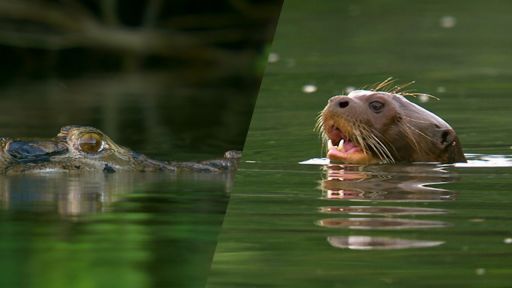At only eight weeks old, otter cubs need to tackle an essential survival skill; learning to swim. Curiously, baby otters don’t really like water, so their caregiver needs to teach them an most important life lesson–water isn’t something to be afraid of.
Features
CHARLIE: To help me reveal what I believe sets otters apart, I''m going to follow three male orphan river otters on their own story of survival.
As they grow, they''ll be taught the vital skills they''ll need for a life back in the wild.
Two brothers, unearthed by construction workers, and another male abandoned by its mother were brought to Wild Instincts Wildlife Rehab Center.
On arrival they were weak, defenseless and would not have survived the night.
Attempting to mirror their wild diet, center manager Mark, is giving them chopped fish and milk formula.
But he has concerns about the weakest orphan.
MARK: He came to us with kind of a bad leg, he had injured the joint on his right rear leg so we''re not quite sure whether it''s gonna heal enough for him to be released or not.
And he also did a, a slight injury to the joint right in here on this leg also and even the good leg is not necessarily a good leg, so what we''re gonna do is try to find a zoo for him if he''s not able to be released back into the wild, and if we''re unable to find a zoo then he may have to be euthanized if we can''t find a place for him to go.
CHARLIE: To keep any attachment to a minimum, it''s Mark''s policy not to name any of the animals in his care.
Now 8 weeks old, the cubs need to tackle an essential survival skill, learning to swim.
Curiously, baby otters don''t really like water So Mark needs to teach them their most important life lesson, that water isn''t something to be afraid of.
Just like their mother would in the wild, Mark makes soothing calls to reassure them.
Each time they try to get out Mark plops them back in.
But their swimming lessons don''t last too long.
That''s because of another surprising quirk of otter biology.
Their coat doesn''t become waterproof until they are 12 weeks old, until then being wet could lead to hypothermia.
So surrogate mom Mark does what he can to help out.
MARK: Normally in the wild what they would be doing is rolling around in the grass and the dirt to kind of get some of the water off themselves and so we can use the towels to kinda help us out a little bit.


